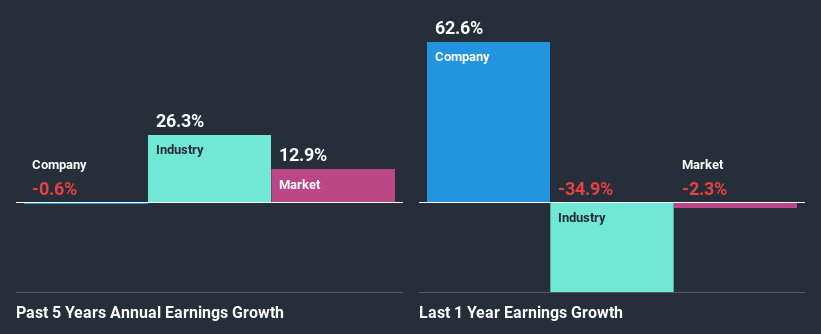Does The Market Have A Low Tolerance For Materion Corporation's (NYSE:MTRN) Mixed Fundamentals?

It is hard to get excited after looking at Materion's (NYSE:MTRN) recent performance, when its stock has declined 6.2% over the past three months. It seems that the market might have completely ignored the positive aspects of the company's fundamentals and decided to weigh-in more on the negative aspects. Long-term fundamentals are usually what drive market outcomes, so it's worth paying close attention. Specifically, we decided to study Materion's ROE in this article.
ROE or return on equity is a useful tool to assess how effectively a company can generate returns on the investment it received from its shareholders. Put another way, it reveals the company's success at turning shareholder investments into profits.
Check out our latest analysis for Materion
How To Calculate Return On Equity?
The formula for return on equity is:
Return on Equity = Net Profit (from continuing operations) ÷ Shareholders' Equity
So, based on the above formula, the ROE for Materion is:
4.1% = US$25m ÷ US$612m (Based on the trailing twelve months to September 2020).
The 'return' is the profit over the last twelve months. Another way to think of that is that for every $1 worth of equity, the company was able to earn $0.04 in profit.
What Is The Relationship Between ROE And Earnings Growth?
So far, we've learned that ROE is a measure of a company's profitability. Based on how much of its profits the company chooses to reinvest or "retain", we are then able to evaluate a company's future ability to generate profits. Assuming everything else remains unchanged, the higher the ROE and profit retention, the higher the growth rate of a company compared to companies that don't necessarily bear these characteristics.
Materion's Earnings Growth And 4.1% ROE
As you can see, Materion's ROE looks pretty weak. Even compared to the average industry ROE of 10%, the company's ROE is quite dismal. As a result, Materion's flat earnings over the past five years doesn't come as a surprise given its lower ROE.
We then compared Materion's net income growth with the industry and found that the average industry growth rate was 26% in the same period.
Earnings growth is a huge factor in stock valuation. The investor should try to establish if the expected growth or decline in earnings, whichever the case may be, is priced in. By doing so, they will have an idea if the stock is headed into clear blue waters or if swampy waters await. Has the market priced in the future outlook for MTRN? You can find out in our latest intrinsic value infographic research report.
Is Materion Using Its Retained Earnings Effectively?
Despite having a normal three-year median payout ratio of 36% (implying that the company keeps 64% of its income) over the last three years, Materion has seen a negligible amount of growth in earnings as we saw above. So there might be other factors at play here which could potentially be hampering growth. For example, the business has faced some headwinds.
Additionally, Materion has paid dividends over a period of eight years, which means that the company's management is determined to pay dividends even if it means little to no earnings growth.
Conclusion
On the whole, we feel that the performance shown by Materion can be open to many interpretations. Even though it appears to be retaining most of its profits, given the low ROE, investors may not be benefitting from all that reinvestment after all. The low earnings growth suggests our theory correct. That being so, the latest industry analyst forecasts show that the analysts are expecting to see a huge improvement in the company's earnings growth rate. To know more about the company's future earnings growth forecasts take a look at this free report on analyst forecasts for the company to find out more.
This article by Simply Wall St is general in nature. It does not constitute a recommendation to buy or sell any stock, and does not take account of your objectives, or your financial situation. We aim to bring you long-term focused analysis driven by fundamental data. Note that our analysis may not factor in the latest price-sensitive company announcements or qualitative material. Simply Wall St has no position in any stocks mentioned.
Have feedback on this article? Concerned about the content? Get in touch with us directly. Alternatively, email editorial-team@simplywallst.com.



